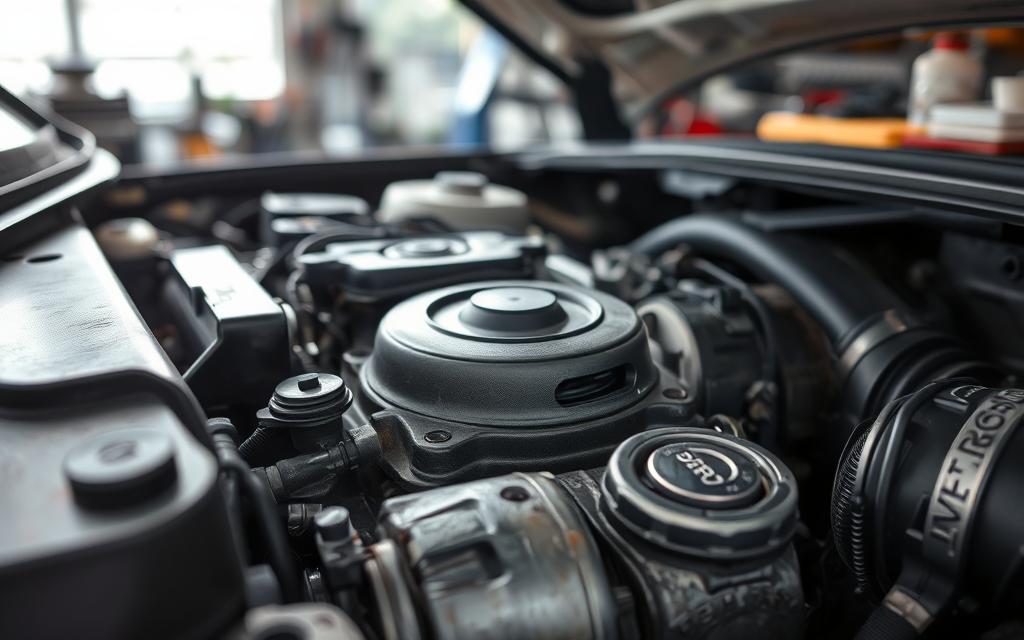Engine ticking is a common worry for car owners. It can mean many things, from small problems to big issues. These sounds can also make your engine lose power, which hurts your car’s performance.
It’s important to know why your engine might be ticking and losing power. Things like low oil, worn-out parts, and bad spark plugs can cause these problems. Even exhaust leaks can play a role.
Key Takeaways:
- Engine ticking can signal a variety of problems, from minor issues to more serious malfunctions.
- Ticking noises are often accompanied by a noticeable loss of engine power, affecting overall vehicle performance.
- Common causes of engine ticking include low oil pressure, worn engine components, fuel system problems, and exhaust leaks.
- Addressing engine ticking issues promptly is essential to prevent further damage and maintain optimal engine performance.
- Regular maintenance and inspections can help identify and address engine ticking problems before they escalate.
What Does Engine Ticking Indicate?
When you hear an engine ticking or clicking noise, it’s crucial to pay attention and investigate the potential causes. These subtle auditory cues can provide valuable insights into the health of your vehicle’s engine.
Understanding Engine Noises
Engine noises can vary in intensity and frequency, and each type of sound can indicate a specific issue. A light, consistent ticking may suggest minor valve train problems. On the other hand, a louder, more pronounced knocking sound could point to more serious concerns like rod knock or worn engine components.
Common Types of Engine Ticking
- Fuel-injected engines can make a ticking noise due to the injector’s firing, which is typically normal and not a cause for concern.
- If the spark plugs are loose or cracked, they can also create a ticking sound in the engine.
- Rod knocking results in a rhythmic, loud ticking noise when accelerating, often indicating a need for a costly engine rebuild.
- Various front engine accessories, such as water pumps, AC compressors, pulleys, or belt tensioners, can also create a ticking noise.
- Engine ticking can also be caused by a loose or damaged engine fan.
Understanding these common engine noises is crucial for early problem detection and prevention of further damage. By identifying the specific type of ticking, you can better diagnose the underlying issue and take the necessary steps to address it.
Common Causes of Engine Ticking
Engine ticking sounds can be worrying, but they often point to simple problems. These issues can be fixed with the right diagnosis and care. Knowing what causes these noises helps keep your car running well for longer.
Insufficient Oil Levels
Low oil pressure is a big reason for engine ticking. This happens when there’s not enough oil. Without enough oil, parts rub against each other, making a ticking sound. It’s key to check and keep your oil level up.
Worn Engine Components
As your engine gets older, parts like bearings and valves wear out. This can cause a ticking sound. Fixing these problems early on is important to keep your engine running smoothly.
Fuel Issues
Problems with fuel can also lead to engine ticking. Dirty fuel injectors or low-quality fuel can cause misfires. Fixing these fuel issues can help stop the ticking and keep your engine running smoothly.
Knowing why your engine ticks is the first step to fixing it. By tackling low compression, worn components, and fuel system problems, you can get rid of the noise and keep your car running well.
“Persistent engine ticking can be a sign of more serious underlying issues, so it’s important to address the problem promptly to avoid further damage or even engine failure.”
The Link Between Engine Ticking and Power Loss
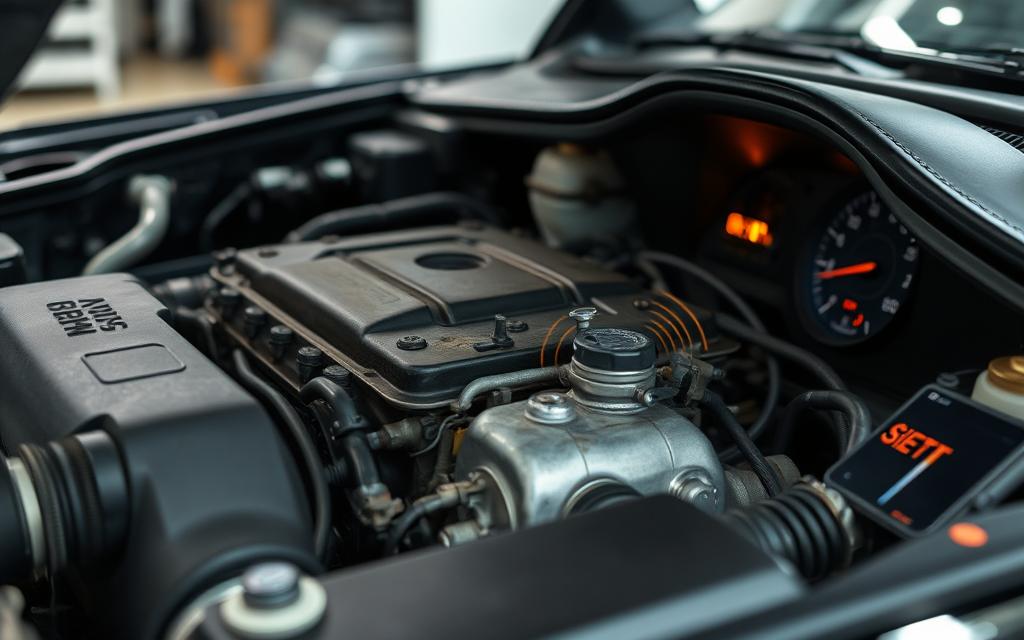
Engine ticking often signals bigger problems. If your engine starts ticking, it means something’s wrong. This noise can make your engine less powerful, leading to slower acceleration and less power overall.
How Ticking Affects Engine Performance
The ticking sound usually points to issues in the valve train or fuel system. Problems like worn parts, misfiring cylinders, or fuel issues can cause it. As these problems get worse, your engine’s power drops. You’ll notice slower acceleration, trouble keeping speed, and poor fuel efficiency.
Indicators of Power Loss
- Reduced acceleration when pressing the gas pedal
- Difficulty maintaining speed, specially on hills or under load
- Increased fuel consumption and decreased miles per gallon
- Overall sluggish engine response and performance
If you hear ticking and notice these symptoms, it’s time to act. Ignoring these signs can cause more damage and even more power loss.
“The engine ticking noise and power loss issue I’m experiencing has been reported by many others in the community. It’s clear this is a common problem that requires prompt attention.”
Diagnosing Engine Ticking
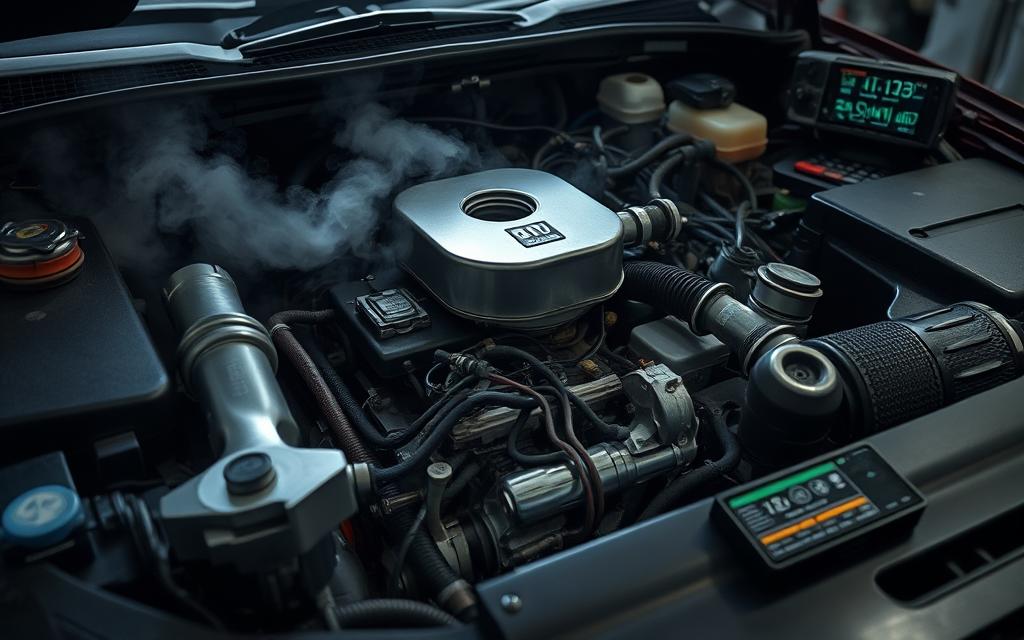
Finding the cause of engine ticking is key to keeping your car running well and avoiding expensive fixes. Mechanics use a mix of looking and listening to find where the noise comes from.
Visual Inspections
First, mechanics do a detailed look-over. They check the oil level to make sure it’s right. They also look for worn-out parts like valves, lifters, or the timing chain.
They search for any signs of damage or wear that might be causing the ticking sound.
Listening Techniques
Next, mechanics use special listening tools to find where the ticking is coming from. They use a stethoscope or similar tool to pinpoint the sound’s source. This helps them focus on the right parts to fix.
They might also do a compression test to check cylinder pressure. This can show problems like bad valves or lifters.
In tough cases, they might use advanced tools like vibration analysis or engine computer checks. These help them find the exact cause of the ticking and any power loss. By using these methods, mechanics can fix the engine’s problems and make it run smoothly again.
“Diagnosing engine ticking requires a meticulous approach, blending visual inspections and targeted listening techniques to pinpoint the source of the problem.”
Importance of Routine Engine Maintenance
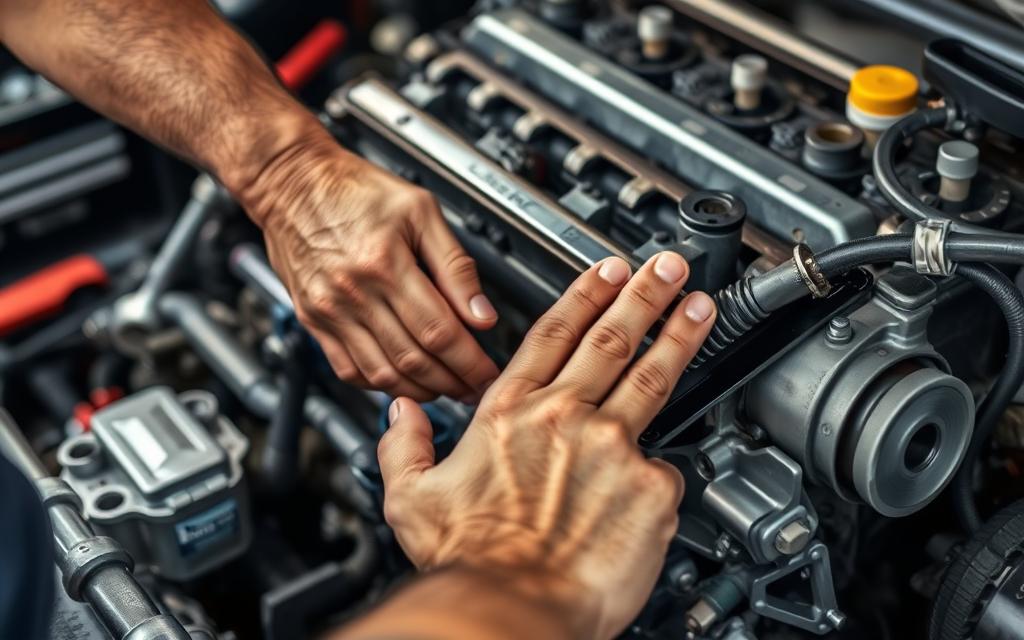
Keeping your engine in top shape is key to its long life and avoiding expensive fixes later. Sticking to a regular maintenance plan helps your engine run smoothly and perform at its best.
Regular Oil Changes
Regular oil changes are vital for engine health. Oil keeps engine parts moving smoothly and prevents wear. As oil gets old, it can’t lubricate well, causing friction and damage.
Checking and Replacing Filters
Don’t forget to check and swap out your engine’s air, fuel, and oil filters when needed. These filters are crucial for keeping your engine efficient and clean. They stop harmful contaminants from getting into your engine.
Evaluating Engine Components
It’s important to regularly check your engine’s parts, like belts and hoses. This helps spot wear or damage early. Fixing these issues quickly can save your engine’s life and avoid expensive repairs.
By focusing on preventive maintenance, you get a longer-lasting engine, better performance, and peace of mind. A well-kept engine means your vehicle is ready for many adventures ahead.
“Proper maintenance can provide nearly a decade of use out of an engine, while exceptional attention to detail and preventative maintenance can extend its lifespan even longer.”
Potential Risks of Ignoring Engine Ticking
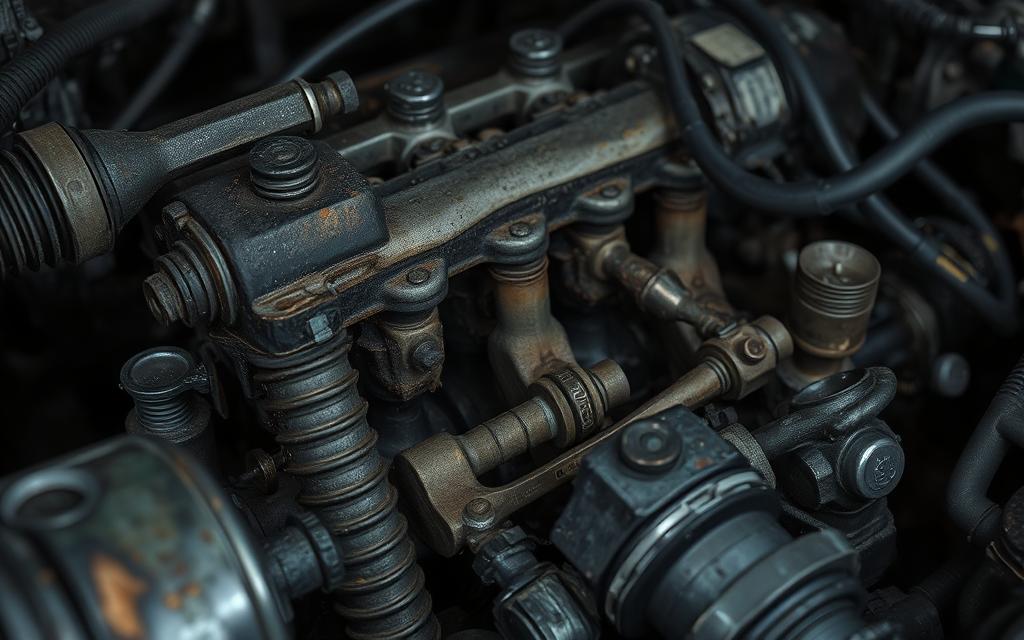
Ignoring the ticking noise from your engine can cause big problems. It can lead to higher repair costs and even a complete engine failure. This is a serious issue that should not be ignored.
Increased Repair Costs
Engine ticking can turn small problems into big ones if ignored. Issues like low oil or worn parts can get worse over time. This can lead to expensive repairs.
Fixing the ticking noise early can stop these problems from getting worse. It helps avoid costly repairs later on.
Risk of Engine Seizure
Ignoring engine ticking can lead to engine seizure. This is a serious problem that can cause the engine to fail completely. It might need a costly rebuild or replacement.
Ignoring these signs can cause a lot of damage. You could end up with a huge repair bill and be stuck on the side of the road.
Fixing the ticking noise early can save you money. It can also help your engine last longer. This way, you avoid a big and inconvenient breakdown.
“Ignoring engine ticking can lead to severe consequences, including increased repair costs and the risk of engine seizure. It’s essential to address this issue promptly to avoid costly and potentially catastrophic engine damage.”
Quick Fixes for Engine Ticking
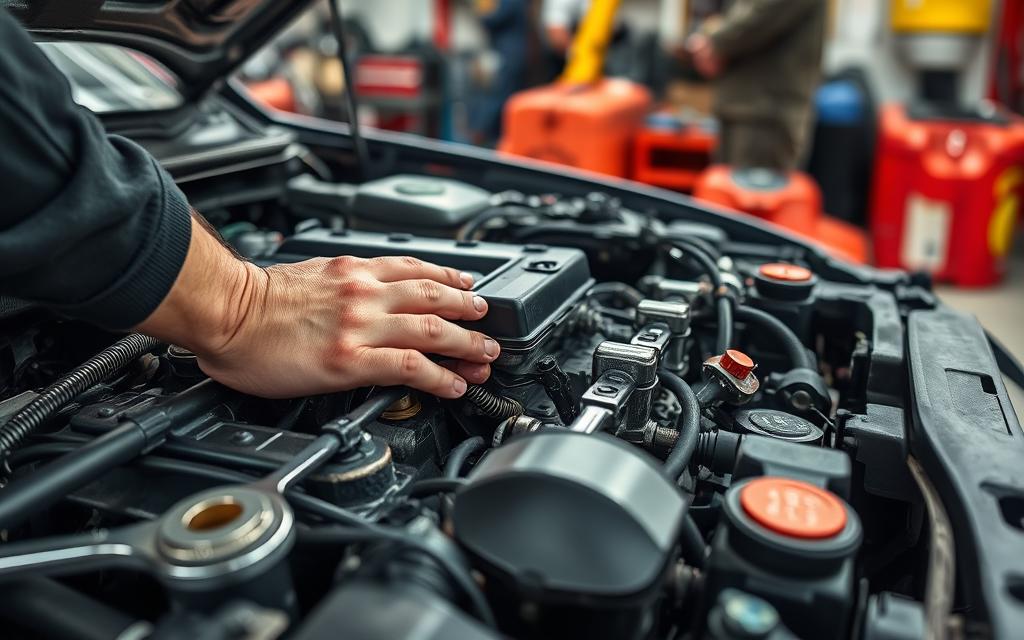
If your car’s engine is making a ticking noise, there are quick fixes you can try. These solutions can help with common causes of engine ticking. They might give you some relief, but they’re not long-term fixes.
Adding Oil
Low oil levels often cause engine ticking. Adding more oil can solve this problem. Without enough oil, parts rub together, making noise. Always check your owner’s manual for the right oil type and amount.
Tightening Loose Parts
Another fix is tightening loose parts. Things like heat shields or engine covers can rattle and make noise. Look over your engine and tighten any loose parts to stop the ticking.
Remember, these quick fixes are temporary. If the ticking doesn’t go away, you need a mechanic to find and fix the real problem. Ignoring engine ticking can lead to bigger, more expensive issues.
“Addressing engine ticking quickly can help prevent further damage and costly repairs.”
While adding oil or tightening parts can help for now, don’t forget about proactive engine maintenance. If the ticking keeps happening, get professional help. Regular DIY engine repair and quick maintenance can prevent bigger problems later.
When to Seek Professional Help

Basic checks and quick fixes can sometimes fix engine ticking issues. But, there are times when you need a pro. If the ticking gets worse or you see other problems, it’s time to get a certified mechanic. They know a lot about professional engine diagnosis and expertise in cars.
Signs That Indicate Serious Issues
Loud ticking, losing power, weird exhaust smoke, or a constant check engine light are bad signs. These could mean clogged fuel injectors, worn spark plugs, or bad oxygen sensors. These problems can hurt your car’s fuel use, speed, and even damage the engine if not fixed.
Choosing the Right Mechanic
Finding the right mechanic for engine problems is key. Look for a certified mechanic with a good reputation in fixing engines. They should have the right tools and know-how to do tests like compression tests and look inside the engine. This helps find and fix the real problem.
A good mechanic will check your car carefully, suggest the right fixes, and make sure your engine runs well. This helps avoid bigger, more expensive problems later on.
Engine Management System and Performance
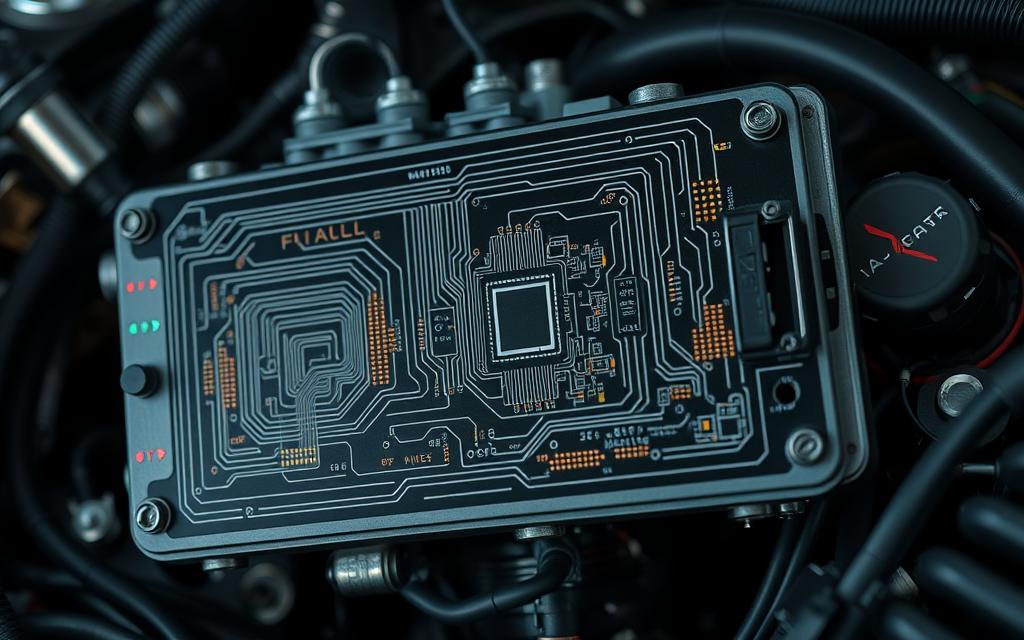
The engine management system is the brain of your vehicle. It makes sure the engine runs well and efficiently. At its center is the Engine Control Unit (ECU), which checks data from sensors all over the engine.
These sensors watch things like engine speed, fuel mix, and ignition timing. They send this info to the ECU for quick changes.
Role of Sensors
Sensors are key in the engine management system. They gather data on how the engine is doing and send it to the ECU. Important sensors include the mass airflow sensor, oxygen sensor, and crankshaft position sensor.
If these sensors go wrong, you might hear engine ticking, feel less power, or even see the engine stall.
Impact of ECU Programming
The ECU’s programming is very important for engine performance. Manufacturers adjust the ECU’s settings to balance fuel economy, emissions, and power. But, problems with the ECU’s software or a bad match between the ECU and engine parts can cause issues.
Modern tools can find and fix these problems. This can stop engine ticking and power loss.
| Sensor Diagnostic Tool Cost | Average Replacement Cost |
|---|---|
| $100 – $400 | $25 – $400 (part only) |
Regular engine care and keeping the ECU updated can prevent problems. This ensures your vehicle runs smoothly. Knowing how the engine management system works helps you keep your engine in top shape.
How Driving Habits Affect Engine Health

Your driving habits can greatly affect your engine’s health and performance. Aggressive driving, speeding, and ignoring engine load can cause stress. This stress can lead to early wear and annoying ticking sounds.
Accelerating with Care
Smooth acceleration is important for your engine’s parts. Quick speed bursts and high revving strain the engine. This can damage pistons, bearings, and crankshafts.
Try to accelerate slowly and smoothly. This lets the engine work best at its optimal RPM.
Maintaining Awareness of Engine Load
Knowing your engine’s load is key, like when towing or going up steep hills. Too much load can cause friction, heat, and ticking sounds. Drive carefully to avoid high RPMs and protect your engine.
“Driving habits that prioritize smooth, gradual acceleration and conscious load management can go a long way in preserving your engine’s health and performance.”
Driving thoughtfully can reduce engine stress and keep it running well for years. A well-maintained engine means a reliable and efficient car.
Fuel Quality and Engine Performance

The fuel you choose affects your vehicle’s engine a lot. It impacts performance, efficiency, and how long it lasts. Picking the right fuel, keeping the fuel system clean, and knowing about octane rating are key. They help your engine run smoothly and efficiently.
Using Top-Tier Fuels
Using top-tier fuels is vital for your engine’s health. These fuels have more detergents and additives. They keep your engine’s parts clean, improving efficiency and performance.
Look for fuel brands that meet the top-tier standards. This ensures your engine gets the best fuel quality.
The Dangers of Contaminated Fuel
On the other hand, bad fuel can harm your engine. Water or dirt in the fuel can clog filters and damage pumps. This can cause misfires and ticking noises.
It also hurts your engine’s fuel efficiency and power. Always check the fuel quality and watch for signs of problems, like a rough idle.
The octane rating of your fuel is also important. Using the right octane rating, as your owner’s manual says, is key. It ensures good combustion and prevents engine knock, which sounds like ticking.
Ignoring the right octane rating can cause power loss and damage. It can also hurt your fuel efficiency and engine over time.
By focusing on fuel quality, using top-tier fuels, and the right octane rating, you can keep your engine in top shape. This minimizes ticking noises and boosts performance and efficiency for your vehicle’s life.
Understanding Engine Power Loss
Feeling your engine’s power fade can be really frustrating. It shows up in many ways, like slower acceleration, worse fuel use, and trouble keeping speed. These problems can really affect how you drive.
Symptoms of Decreased Power
One big sign of power loss is when your car doesn’t accelerate as well. You might feel like the car is slow to respond when you press the gas. Also, your car might not reach its top speed as easily.
Another sign is using more fuel than usual. This happens because the engine has to work harder, which means it uses more gas. This can make your fuel costs go up and your car less efficient.
You might also notice your car vibrating or making strange noises. These can be felt through the steering wheel, pedals, or the whole car. Unusual sounds like knocking or rattling can also mean something’s wrong with your engine.
How to Identify Causes
Finding out why your engine’s power is dropping down needs a careful look. Look for patterns in how your car performs. This can give you clues about what’s going on.
- Problems with the fuel system, like a clogged filter or bad injectors, can stop your engine from getting enough fuel.
- Issues with the ignition system, like bad spark plugs or coils, can lead to incomplete burning of fuel and less power.
- A clogged air filter can mess up the air-fuel mix, hurting your engine’s power.
- Blockages in the exhaust system, like a clogged catalytic converter, can make it harder for gas to get out, reducing power.
- Worn-out parts inside the engine, like piston rings or valves, can directly cut down on power.
- Failed sensors, like oxygen or throttle position sensors, can give wrong readings, causing power loss.
Using tools to diagnose and getting a professional’s help can find the exact cause. This way, you can fix the problem and get your engine running smoothly again.
“Proper diagnosis and prompt repair of engine power loss issues are crucial for maintaining the overall health and performance of your vehicle.”
Engine Overheating and Ticking
When an engine overheats, it can cause many problems. One of these is the sound of ticking. This happens because the engine parts expand, making these sounds. It’s important to know why engines overheat and how to stop it to keep them running well.
Common Overheating Causes
There are a few reasons why engines might overheat. These include coolant leaks, bad thermostats, and failing water pumps. When the coolant system doesn’t work right, the engine gets too hot. This makes the engine parts expand and can cause ticking sounds.
- Coolant leaks in hoses, radiators, or engine blocks stop heat from being released, causing overheating.
- A bad thermostat can’t control coolant flow, leading to overheating.
- A malfunctioning water pump can block coolant flow, causing the engine to overheat.
Prevention Tips
To avoid engine overheating and ticking sounds, take some steps ahead of time. Keeping the coolant system in check is key. Also, don’t ignore any warning signs of overheating.
- Check the coolant system for leaks and keep the levels right.
- Keep the radiator clean to ensure good airflow and heat release.
- Fix any overheating warnings right away to avoid engine damage.
By tackling the reasons for overheating and taking preventive steps, you can keep your engine healthy. This reduces the chance of hearing ticking noises. Keeping the cooling system in good shape is vital for your engine’s performance and life.
The Role of Engine Age and Wear
As cars get older and rack up miles, their engines start to show wear. This wear can lead to engine ticking noises and power loss. Knowing what causes engine wear is key to keeping older cars running well.
Factors Contributing to Wear
Wear on engines comes from several sources. High mileage, tough driving conditions, and poor maintenance are big contributors. Spark plugs, oxygen sensors, and fuel injectors wear out faster with more miles.
Driving hard, like towing or off-roading, also speeds up engine wear. Not changing oil regularly or skipping inspections can make things worse. Keeping up with maintenance helps engines last longer and avoids problems like ticking noises or power loss.
Maintenance Tips for Older Engines
- Use top-notch lubricants and follow the oil change schedule to protect your engine.
- Check spark plugs, oxygen sensors, and fuel injectors often and replace them when needed.
- Fix small problems quickly to avoid bigger, more costly issues.
- Think about using engine additives or treatments to reduce wear and boost efficiency in older cars.
Following these maintenance tips and keeping an eye on your engine can help it last longer. This reduces the chance of hearing ticking noises or experiencing power loss.
| Component | Average Lifespan |
|---|---|
| Spark Plugs | 30,000 – 100,000 miles |
| Oxygen Sensor | 80,000 – 100,000 miles |
| Fuel Injectors | Cleaning every 30,000 miles |
| Engine Bearings | Rattling or knocking sound indicates wear |
| Engine Mounts | 5 – 7 years, depending on application |
Understanding engine age and wear helps car owners take care of their engines. This way, they can keep their cars running well, even as they get older and have more miles.
Future Technologies to Address Engine Issues
The car industry is always changing, bringing new tech to solve engine problems like ticking sounds and power drops. Companies are working on better engine designs and advanced tools to help drivers keep their cars in top shape.
Innovations in Engine Design
Car tech is getting better fast, aiming to cut down on friction, boost efficiency, and make engines last longer. For instance, Volvo’s 2024 VNL has a special engine with seven waves on its pistons. This design cuts soot emissions and makes combustion more efficient.
The 2027 engine rules are pushing for even greener and more efficient engines. Cummins’ 2027 HELM X15 diesel engine has a new aftertreatment system. It uses two electric heaters and a 48-volt alternator for quick warm-up and constant NOx reduction.
Upcoming Diagnostic Tools
New diagnostic tools are also on the horizon to catch engine problems early. These tools include advanced sensors and AI systems that spot issues before they become big problems. Toyota is moving a big part of its R&D team and budget to these predictive maintenance systems.
By combining these new engine designs and diagnostic tools, car makers hope to make car care more proactive and accurate. This will improve how reliable and powerful cars are.
Conclusion: Keeping Your Engine Healthy
Keeping your engine in good shape is key to your car’s long life and performance. Knowing about common problems like engine ticking and power loss helps. Fixing these issues early can stop them from getting worse and costing a lot.
Summary of Key Points
We’ve looked at why engines tick, like when oil is low or parts wear out. We also talked about how engine ticking can lead to power loss. Regular maintenance, like oil changes and filter swaps, is crucial. By watching for odd noises and performance issues, you can keep your engine running well for longer.
Encouragement for Proactive Maintenance
Being proactive with your engine’s care is essential for a long-lasting vehicle. Knowing what your engine needs and getting help when needed can prevent big problems. Taking care of your engine is an investment in your car’s life and your own safety on the road.
FAQ
What does engine ticking indicate?
What are the common causes of engine ticking?
How does engine ticking affect power loss?
How can engine ticking be diagnosed?
Why is routine engine maintenance important for preventing ticking noises and power loss?
What are the potential risks of ignoring engine ticking?
When should professional help be sought for engine ticking?
How do driving habits affect engine health?
How does fuel quality affect engine performance?
How can engine overheating contribute to ticking noises?

Jack Thompson is a writer and seasoned auto mechanic with over 15 years of experience in the automotive industry. Known for his expertise in vehicle mechanics, Jack has a deep understanding of car and truck systems. His skills, honed through years of hands-on experience, have made him a trusted name in the field. Jack is committed to providing valuable insights into car maintenance and repair, helping vehicle owners keep their vehicles in top condition.

